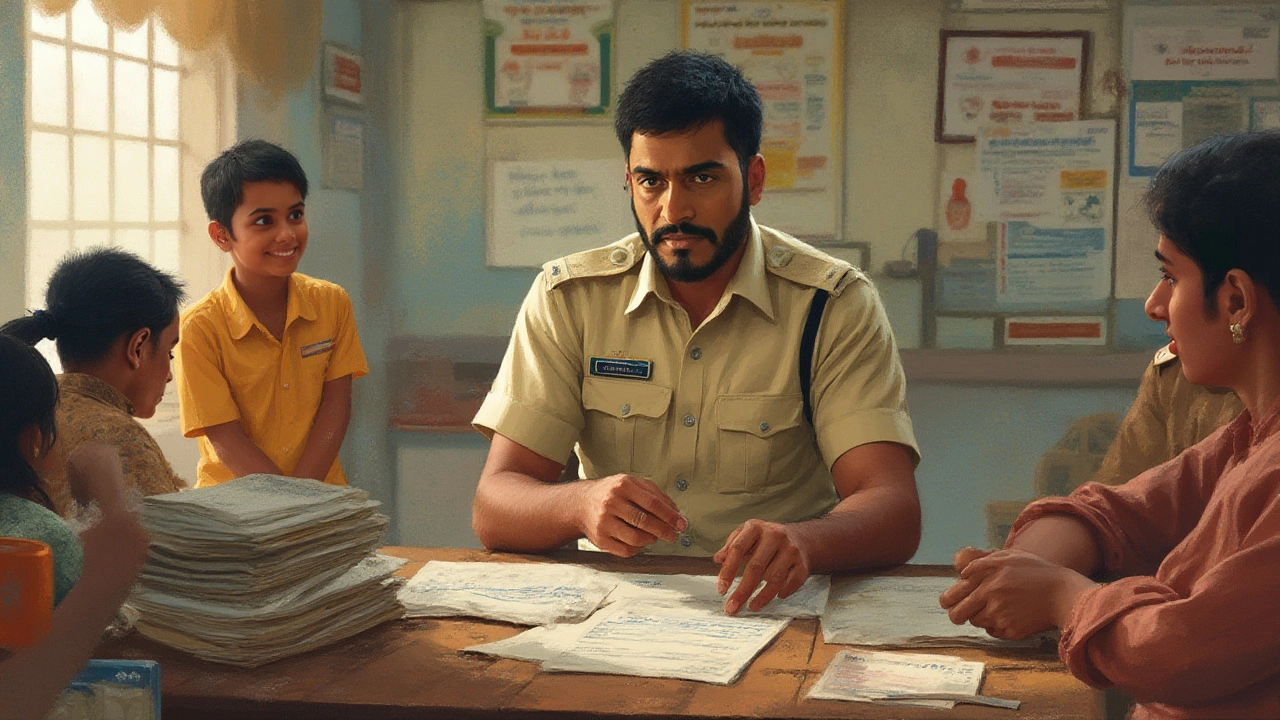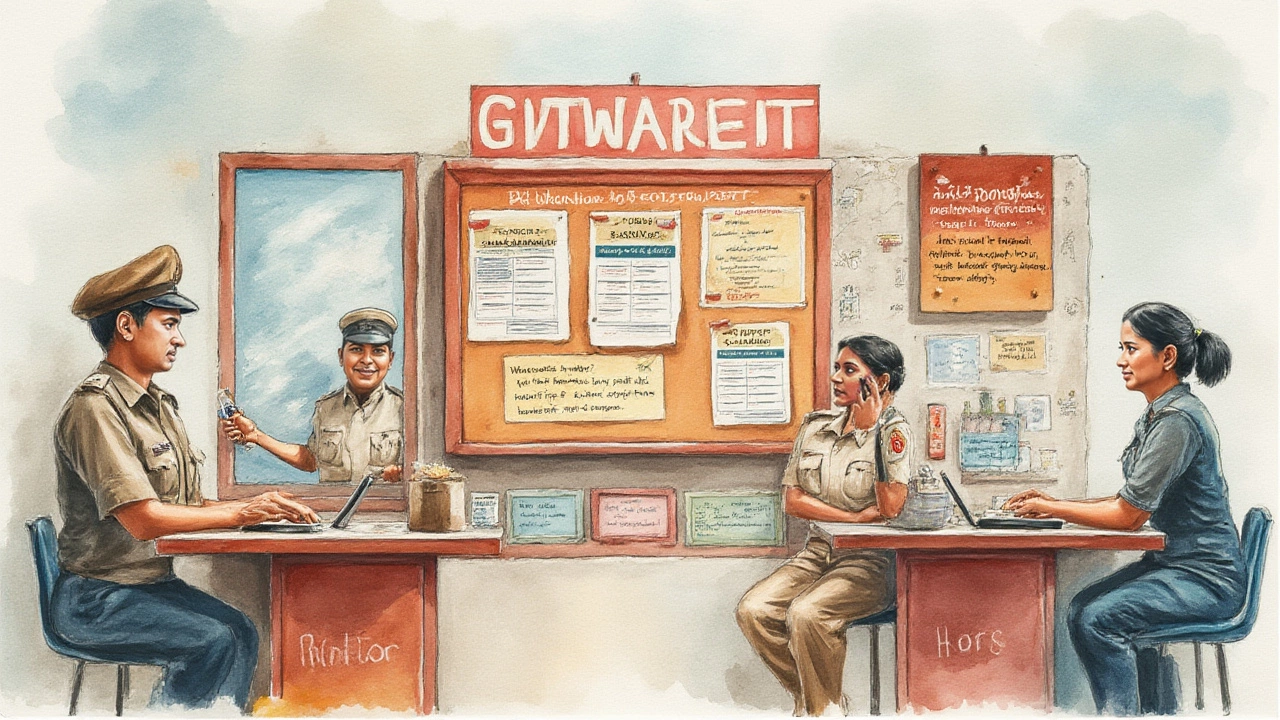Want job security that doesn’t vanish when the next big tech wave crashes? Think of the Indian government sector—it never goes out of business. Every year, millions line up for government jobs, but almost all of them start with the same thought: where do I begin? Funny enough, there’s no official playbook. Yet, government jobs touch nearly every part of Indian life, from managing city traffic to running the country’s biggest banks. If there’s one thing I wish I’d known as a fresh graduate, it’s that building a career in government is very different from just chasing a job opening.
The Big Picture: Why Government Jobs Still Matter
Let’s tear down a myth: government careers aren’t just about desk work or outdated systems. These jobs run the backbone of India—schools, health, law, space, water, defense, roads, digital projects, you name it. In 2025, demand has only gone up. According to the Department of Personnel and Training, there are over 4.7 million vacant government posts, ranging from entry to senior level. So, there’s opportunity if you know what you’re looking for.
Government jobs have been synonymous with stability. That “job-for-life” reputation is real—gratuity, pension, healthcare, kids’ allowances. My daughter Kavya sometimes jokes, “Dad, you get more holidays than me!” Yes, there are days off. But throw in transfers, public responsibility, and deadlines—it isn’t slow or easy. Diversity is another reason people find it appealing. From scientists at ISRO launching satellites to English teachers shaping the next generation; from railway traffic controllers to customs officers—no two jobs look the same.
The flip side? It isn’t as easy as forwarding a resume to HR. Most government jobs require you to pass competitive exams. For central jobs in India, these range from the Civil Services Examination (conducted by UPSC) to SSC, RRB, and specialized banking, insurance, or defense exams. State governments run their own batch of PSCs. Last year alone, more than 28 million people sat for SSC and railway group exams; for the famed UPSC, over 1.2 million applied for less than 1,000 posts.
But why do so many chase these posts? Here’s some real talk:
- Transparent promotion system (most of the time, your seniority and exams matter, not networking alone)
- Decent starting pay—post 7th CPC, entry-level Group B/C services can give INR 35,000-70,000 monthly, plus benefits
- Definite work-life balance (with exceptions in field jobs)
- Social prestige and recognition, especially in small towns and tier-II cities
- Chance to create real impact—form policies, solve community issues, run public events
Here’s something that surprised even me: According to a study published in the Economic and Political Weekly, over 75% of new entrants into the government sector come from non-metropolitan backgrounds, breaking the old stereotype that you need an English-medium or privileged background. It’s open—but fiercely competitive.
| Exam | No. of Applicants (2024-25) | Seats |
|---|---|---|
| UPSC Civil Services | 1,200,000+ | 980 |
| SSC Combined Graduate Level | 9,200,000+ | 13,300 |
| RRB Group D | 15,000,000+ | 103,769 |
Source: India Government Data 2024

Step-by-Step: How to Start Your Government Career
The first thing I tell friends or my own son Nihal: don’t start with exams, start with the end goal. Do you want a desk job, fieldwork, technical role, something with travel—or a mix? Each agency and exam caters to a different crowd. Let’s break it down:
- Understand Job Categories: There are Group A (like IAS, IPS, IRS, IFS), Group B (officers, less powerful than group A, but still managerial), Group C and D (clerks, assistants, frontline staff). Central and state governments both hire pretty much every year.
- Pick Your Path: For high-impact leadership roles (IAS, IPS, IFS), focus on the Civil Services Exam (UPSC). For banking, prep for IBPS or SBI PO/Clerk. SSC CGL is huge for graduate-level jobs—income tax inspector, CBI, customs, auditor, railways, and more. RRB covers massive railway opportunities. Teaching jobs? You’ll need CTET, TET, or equivalent. Even state police or secretariat positions need local exams.
- Match Qualification: Most exams want a bachelor’s degree. Some technical jobs (engineering, medicine, IT, agriculture) may require a relevant degree or diploma. Double-check the “eligibility” each year on official portals. The government is strict—even a small paperwork error can get your application rejected.
- Prepare for the Exam: This is the biggest mountain. You’ll need 6 months to 2 years of focused study, depending on the post. Standard advice? Get a good guidebook, follow previous year papers, and pick one solid online course—or join a trusted coaching center if that works for you. Daily practice matters more than cramming. Tip from my old roommate (now in IFS): "Solve mock tests every week. It’ll teach you time management and build confidence."
- UPSC: Read national dailies (The Hindu, Indian Express), standard books (Polity by M Laxmikanth, Economy by Ramesh Singh), and enroll in test series.
- SSC CGL: Focus on math, reasoning, English, and GK. Books like R S Aggarwal (Quant) and Lucent GK are still gold.
- Banking: Work on speed maths, current affairs, and computer awareness.
- Registration & Application: You must watch for deadlines—most forms go live once a year. Fill out every section, upload the right documents, and pay the fee on time. Use only the official government websites (like upsc.gov.in, ssc.nic.in) to apply. No shortcuts, no middlemen—it’s all digital now.
- Clear the Prelims/Main Interview: Most exams have two or three phases: objective (prelims), written (mains), then personality/interview. Some, like state PSCs or police, may add a medical or physical test.
- Document Verification: You clear the exam, then the real nail-biter happens—background and certificate checks. Keep all originals and several copies ready. If anything is missing, your offer can be canceled.
- Initial Posting & Training: Once you get in, the excitement really begins. Many government jobs come with hands-on training—could be in a remote district, a city, or even out of state. This phase builds your real-life skills.
And here’s a fact most don’t mention: the government has moved fast to cut cheating. It now uses bio-metric attendance, AI-run computer exams, and strict invigilators. So, focus on honesty and hard work—shortcuts rarely work.
Some quick hacks my friends (now in different government roles) swear by:
- Make a simple planner—schedule 2-3 hours daily for steady prep, more on weekends
- Join a study group—WhatsApp or Telegram groups share daily updates and discussion questions
- Don’t stick with outdated books—new exam patterns and current affairs matter most now
- Copy toppers’ answer-writing styles (UPSC especially!)
- For interviews, practice answers aloud with friends or mentors. Be honest if you don’t know something—inventing facts is an instant fail
A government salary can change lives. But the journey is rarely instant. I know three people who cracked SSC after their third try—and their work today, from tax inspection to public safety, really matters to their communities. Grit and patience win, more than shortcuts ever will.
"An honest public servant holds a mirror to society’s progress, not just its paperwork." – Dr. S.Y. Quraishi, Former Chief Election Commissioner of India

What Happens Once You Get In?
There’s a scene most Bollywood movies miss—first day at the office. Everything smells new—files, tables, that faint scent of sanitizer. But it isn’t just you typing away in silence. Modern government offices are buzzing: online meetings, project reviews, even launch events live-streamed. A typical day? It depends, wildly. If you’re in revenue, you might chase tax evaders all day. If you’re in education, you could be monitoring 40 schools from your laptop. Bank PO officers? They’re opening loans for startups and pensioners in the same breath.
Here’s where public sector jobs cut different from private ones: transparency and accountability are taken seriously. Misspend one rupee, misplace a file, or skip a deadline and it could show up in an audit. There are regular reviews, sometimes surprise checks. Promotions depend on performance (and sometimes on clearing another departmental exam). The days of "just coasting" are fading fast. In 2024, the Ministry of Personnel introduced Continuous Assessment Modules—so your work gets tracked with regular feedback and timelines.
Don’t believe the myth that all government jobs are super slow. Departments like UIDAI processed nearly 60 million Aadhaar enrollments in a single quarter. Income Tax asked all officers to clear refund backlogs worth ₹15,000 crore in just three months last year. There is pressure, but also support—good bosses mentor you, and almost every workplace offers support, from childcare to legal advice.
What about future growth? Here’s a peek at how promotions stack up in the central government:
| Service Type | Promotion Period (Average) | Top Possible Rank |
|---|---|---|
| IAS (Group A) | 4-6 years (first) | Secretary/Chief Secretary |
| SSC CGL (Group B) | 6-8 years (first) | Joint Secretary/Commissioner (varies) |
| Bank PO | 3-5 years (first) | General Manager/Director |
Expect tough competition at every level, but exams, annual reviews, and skill upgrades (yes, online certifications are encouraged) count more now than “who you know.” Government also supports lateral entry now—experienced folks from the private sector can land mid-senior roles after clearing special tests.
And what about the perks? This is a part my family still rib me about. Pretty good housing, medical plans, easy education loans, and—believe it or not—leaves to study further. I know IAS officers who took sabbaticals to train abroad, then brought those skills back. Just keep in mind: the glamour fades when you have to move cities often. Yet, for many, that mobility is part of the fun.
How can you stand out once inside?
- Upgrade your computer/digital skills—offices are moving paperless (think e-Office, PFMS, GeM portals).
- Volunteer for special assignments and big public projects—great for your record and learning.
- Network with seniors and mentors within the service; they’ll steer you right.
- Keep yourself updated: Laws, regulations, and schemes change every quarter. Subscribe to PIB (Press Information Bureau) releases and government newsletters.
- Speak up—bring new ideas. Many departments reward innovative ideas now (and it goes on your annual report).
There’s a hard truth: the best way to grow in government is to keep learning, not just coasting. If you do good work and stay curious, your role keeps getting bigger. It’s not always easy, but it’s definitely worth it for those who want to make a mark beyond just pay stubs. As someone who’s seen both private and public worlds, I told Nihal and Kavya: government work gives you a front-row seat to the drama (and sometimes the chaos) that actually shapes our country. Give it a real shot—it can be one of the most rewarding moves you’ll ever make.

